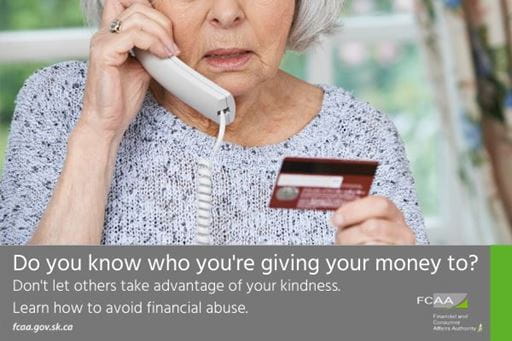Released on July 27, 2020
The Financial and Consumer Affairs Authority of Saskatchewan (FCAA) wants to educate seniors on how to protect themselves from financial scams and frauds.
“As financial abuse affects many seniors in Canada, we want to protect seniors by providing information and resources that will help them identify and avoid exploitation,” FCAA Securities Division Director Dean Murrison said. “Seniors can protect their money by understanding the warning signs of financial fraud and by being cautious when speaking to people on the phone they do not know.”
In some cases, seniors end up losing money by giving out their credit card or banking information to fraudsters or occasionally dishonest family members.

Here are some red flags and preventative tips to help avoid exploitation:
- If you receive “prize offers” without engaging or enrolling with the business offering the prize, do not reply to them.
- If someone emails, texts, or calls asking for personal or banking information, do not provide the information.
- If a stranger sends you a cheque, do not accept it as the cheque may bounce after you deposit it.
- If you receive an email with an attachment from people you do not know, do not open or download the attachments.
For more information about senior financial abuse and tips for family members and caregivers visit https://fcaa.gov.sk.ca/financial-literacy/seniors/senior-financial-abuse.
-30-
For more information, contact:
Stephanie Wilkinson
Financial and Consumer Affairs Authority of Saskatchewan
Regina
Phone: 306-787-5567
Email: stephanie.wilkinson@gov.sk.ca

